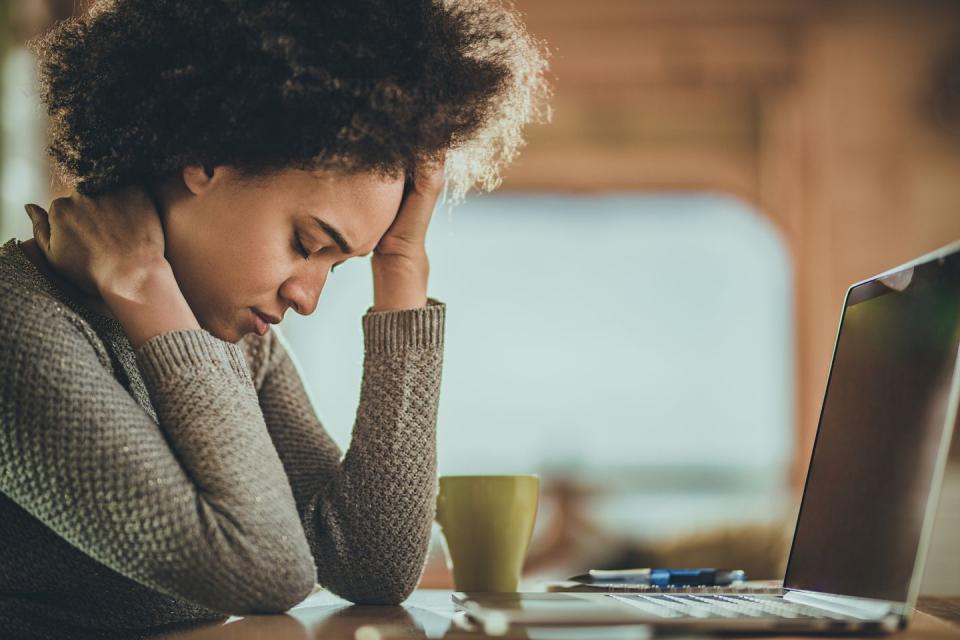Addicted to Coffee? 9 Symptoms of Caffeine Withdrawal and How to Treat Them

Whether you’ve consciously decided to cut back, or you’ve been running too late to stop for your morning cup of coffee, if you feel awful anytime you’re low on caffeine you might be experiencing the symptoms of caffeine withdrawal.
“Caffeine dependency basically is defined as a person’s inability to perform daily activities of life without caffeine. In other words, if you’re unable to function without your daily cup of coffee in the morning there’s a decent chance you are dependent on caffeine,” explains Vivek Cherian, M.D., Chicago-based internal medicine physician.
What is caffeine withdrawal?
Caffeine withdrawal happens when someone who routinely consumes caffeine stops. This can cause an inability to carry out some of your more basic tasks which can come on quickly, according to Dr. Cherian.
“Withdrawal symptoms typically start around 12-24 hours from your last dose of caffeine.” That means if your last cup of coffee was yesterday at 9 in the morning, you could already begin feeling the effects of withdrawal as soon as you woke up this morning.
Caffeine withdrawal: signs, symptoms, and treatments
While going through withdrawal symptoms is definitely possible (and is actually considered a disorder), experts note that some of these symptoms might be psychosomatic (a.k.a. in your head). “One of the reasons caffeine is so addicting is that drinking a cup of coffee is an act that’s a deeply ingrained part of our daily routines and social lives,” explains Don Raden M.D., F.A.A.O.T., integrative physician, addiction expert at Raden Wellness, which is why he says caffeine can be as psychologically addicting as it is physically addicting. “The act of drinking coffee first thing in the morning, as an afternoon pick-me-up at work or with dessert after dinner becomes habitual. Over time, those habits can become so deeply ingrained in our daily routines that it can be very tough to break.”
If you’ve recently quit caffeine, here are some signs and symptoms that your body is missing it:
1. Increased tiredness
People usually consume caffeine to combat fatigue, so it’s no wonder that you’ll feel even more exhausted without it. “Your body is used to a stimulant and no longer has this external energy boost,” explains Courtney Scioli, registered nutritionist and founder of Simply. “I recommend cutting back on caffeine intake on a week when you are able to get adequate rest.” Since the afternoon a common time when withdrawal symptom set in, she recommends taking a walk outside to increase energy levels.

2. Constipation
That morning cup of coffee can get you moving in more ways than one, which is why Dr. Raden says it’s common to have the opposite effect once you aren’t getting as much of it as you’re used to. “Caffeine has been proven to stimulate bowel movements so going off of caffeine suddenly can cause constipation,” he explains. “Be sure to drink plenty of water and eat a diet high in leafy greens and other fiber-rich foods to help you get your system back on track.”
3. Headaches
Because caffeine consumption changes the blood vessels in the brain, Scioli says a sudden change in how much you’re consuming can cause headaches. “Severity is dependent on the person,” she says, adding that she often recommends turmeric supplements as a natural anti-inflammatory to her clients.

4. Depression
According to Dr. Raden, caffeine is an adenosine receptor antagonist and, as such, is a known mood elevator. “The stimulant effects of caffeine have also been shown to increase feelings of well-being,” he explains. “For this reason, depression is a common symptom of caffeine withdrawal.” To combat those withdrawal-inspired blues you should make sure you’re tending to some of those other symptoms that could be exacerbating some of those bad feelings.
5. Tremors
While rare, Dr. Raden says that tremors (uncontrollable shaking of the hands) can also be a symptom of caffeine withdrawal. Fortunately, he says there’s nothing you need to do to combat your tremors, they should resolve on their own within a few days.
6. Irritability
Being tired and having a headache is a recipe for a bad mood, according to Scioli. “Caffeine can cause the release of numerous hormones and increase neurotransmitters,” she says. “Stopping this effect suddenly can cause cognitive changes.” Fresh air and a change of scenery may help elevate your mood a bit, but some cognitive changes have to play out until your body adapts to the changing hormones. “When I have clients who are looking to stop drinking caffeine, I often recommend decreasing the amount they are drinking over a five-day period. Ultimately including no caffeine on day six.”

7. Nausea
A lack of caffeine can wreak havoc on your digestive system. “This is a side effect of caffeine withdrawal that many people do not expect,” Scioli says. “Ginger tea is a great source of relief for an upset stomach.”
8. Insomnia
It may be hard to believe it, but Dr. Raden says insomnia is one of the most common symptoms of caffeine withdrawal. “Ironically, cutting down on caffeine too quickly can disrupt sleep the same way consuming too much caffeine does,” he says. “It may take a week or two for your sleep cycle to reset itself.”
9. Brain fog
Caffeine increases the production of the neurotransmitter dopamine, explains Scioli. “Dopamine is associated with attention levels and motivation. Withdrawal decreases this production.” Depending on the individual, she says these symptoms may be extreme, or hardly noticeable.
You Might Also Like

